
A blog of the Kennan Institute
Vladimir Putin’s initial appointments since his reelection have produced few surprises. Many of the old guard remain in place, most notably Prime Minister Dmitry Medvedev. Meanwhile, the “new” faces include Alexei Kudrin as head of the Audit Chamber. Kudrin, of course, is not new at all, having previously served for more than a decade as finance minister.
As these actions suggest, the status quo reigns supreme in Putin’s Russia, and with it a narrow understanding of politics that is unlikely to change—or promote change—unless compelled by outside events. But while Russia may well be suffering from political atrophy and a weak economic recovery, one man’s stagnation is another man’s stability. And domestic stability may be all that Putin needs to play on the world’s stage.
Putin’s disdain for politics was on prominent display both during his campaign (which he barely bothered to undertake) and in the aftermath of his resounding victory. The day after his reelection he gathered the defeated candidates together and warned of difficult decisions ahead. He offered dialogue, but not genuine political debate. According to Putin, the assembled party leaders should be guided by “the long-term interests of Russia and the Russian people” and should push back against “group and party interests.”
Putin’s comments confirmed the limited role that real politics plays in his governing philosophy. But not only does he stand above politics, he transcends any formal division of powers as well. Just before his inauguration, Putin published his May 2018 decrees outlining his plans for his fourth term. The decrees outlined an ambitious agenda—in terms of investment in education, health care, infrastructure, and the like—along with some bold goals connected to increasing life expectancy, birth rates, and economic growth.
If these May decrees sound familiar, they should. Six years ago, after his 2012 presidential election, Putin issued a similar set of decrees with equally extravagant goals. They essentially became the Duma’s legislative program and were never abandoned, even at the height of the 2014–2016 recession. Indeed, special monitoring groups were established to measure the implementation rate of Putin’s May 2012 decrees. The Duma has a new set of marching orders, and it now needs to find the money (an estimated $128 billion over six years) to fund the projects.
If national politics poses no challenges to Putin’s rule, how about regional politics? Fifteen regions held gubernatorial elections in September 2017. All were won by Putin’s United Russia party, which is not that surprising, since the registration requirements are so cumbersome that the possibility of an outsider actually getting on the ballot—let alone being elected governor—are remote. Moreover, Putin now will have the opportunity to designate additional regional leaders. Some governors received government positions in the aftermath of Putin’s victory, thereby creating new vacancies, while in two regions, Iakutiia and Altai, the governors were removed in part because of their failure to deliver sufficiently large majorities for Putin’s reelection.
A few cities still have open elections for mayor, but that option is about to contract as well. In 2013, Ekaterinburg elected the reformer Evgenii Roizman mayor, and he remains popular today. He won’t be seeking a second term, however, because the Sverdlovsk regional assembly has now abolished the direct election for mayor and replaced it with an appointment process involving regional administration and city council officials. And so another level of political competition has been compromised, leaving only local district councils—the weakest of all legislative bodies—as the one place where opposition candidates can enjoy limited success.
But what is left of the political opposition? Putin regularly pours scorn on his most prominent critic, Alexei Navalny, even as he chooses not to refer to him by name. Yet the most revealing split is not necessarily between Putin and his liberal opponents, which is to be expected, but within the liberal movement itself. A day after the election, Ksenia Sobchak and Navalny engaged in a lively public debate on TV. Sobchak ran for president with the Kremlin’s implicit approval, while Navalny was ruled ineligible because of an earlier trumped-up criminal conviction.
Sobchak pleaded for increased cooperation during the interview, but Navalny summarily rejected such appeals, dismissing Sobchak as a hypocrite and a Kremlin stooge. Navalny heads a national political movement, while Sobchak (based on her 1.7 percent election results) clearly does not. Nevertheless, Navalny’s unwillingness to even consider dialogue with Sobchak suggests that a united challenge to Putin may well be beyond the capabilities of Russia’s divided opposition.
The marginalization of politics means that little will change internally during Putin’s fourth term, especially if the price of oil continues to rebound and modest economic growth returns. The recently completed St. Petersburg Economic Forum suggests that Western investors may once again be willing to enter the Russian market, especially with the enticement of large state contracts.
Putin’s political system remains highly susceptible to sudden shocks. As the tragic fire in Kemerovo on the eve of Putin’s inauguration demonstrated, local events quickly become nationalized if there are no trusted intermediary institutions to address basic governance issues. Moreover, Putin has apparently decided to pursue several hot-button issues—tax reform, pension reform—that, if mishandled, could still produce a swift negative public reaction. Russia is uniquely vulnerable to sanctions, as Mr. Deripaska and Mr. Vekselberg learned to their detriment. Finally, by closing off public debate, Putin encourages the creation of a nonsystemic opposition that inevitably will pursue confrontation and not compromise.
The long-term weaknesses of Putin’s governing strategy may be self-evident, but considerable doubt now exists as to whether the anticipated backlash against Putin’s rigid top-down system will occur during his tenure in office. And in the interim, Russia looks like a bastion of stability in comparison with the transatlantic alliance, where (just to name the most prominent liabilities) Brexit, Italy’s impending challenge to the EU, and the United States’ retreat from established diplomatic and global trade practices are all straining the long-standing ties of Western unity.
Putin appears ready to pursue new foreign policy opportunities as they present themselves. His success, however, in large measure depends on domestic stability and on how well he continues to manage a political system without politics. The odds look better than they have for a long time.
Author


Kennan Institute
After more than 50 years as a vital part of the Wilson Center legacy, the Kennan Institute has become an independent think tank. You can find the current website for the Kennan Institute at kennaninstitute.org. Please look for future announcements about partnership activities between the Wilson Center and the Kennan Institute at Wilson Center Press Room. The Kennan Institute is the premier US center for advanced research on Eurasia and the oldest and largest regional program at the Woodrow Wilson International Center for Scholars. The Kennan Institute is committed to improving American understanding of Russia, Ukraine, Central Asia, the South Caucasus, and the surrounding region through research and exchange. Read more

Explore More in The Russia File
Browse The Russia File
Chechnya as a Model of Modern Russia

Russia’s Indigenous Communities and the War in Ukraine

Gas and Power in a Changing US–Russia Relationship

